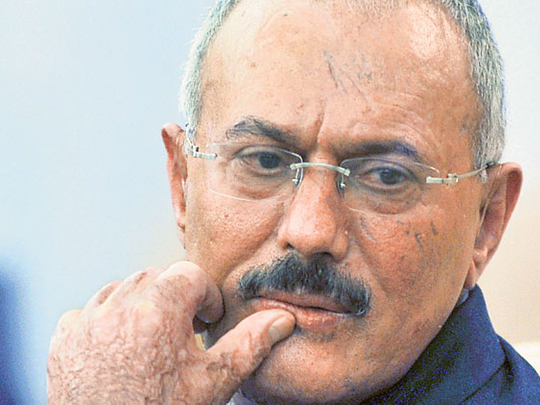
Washington: The Obama administration is weighing an unprecedented diplomatic act — whether to bar a friendly president from US soil.
American officials were evaluating on Tuesday an awkward request from Yemeni strongman and long-time US counter-terrorism partner Ali Abdullah Saleh. Saleh said he plans to come to the US for medical treatment for injuries suffered in a June assassination attempt, and he has asked for a US visa for entry. Fearful of appearing to harbour an autocrat with blood on his hands, the Obama administration was trying to ensure that Saleh visits only for medical care and does not plan to stay, US officials said.
Washington's hesitation reflects the shifting alliances and foreign policy strategy prompted by a year of upheaval in the Arab world. Saleh has served as an American ally against Al Qaida and will soon transfer power under a US-backed deal with Yemen's opposition. He isn't subject to any US or international sanctions.
But, he is accused of committing gross human rights violations during a year of internal conflict, and the US is trying not to burn any bridges with Yemeni political groups likely to take part in future governments.
Antagonising Yemenis
Political asylum for Saleh in the US, or the appearance of preferential treatment from an administration that has championed peaceful and democratic change, would be highly unpopular with Yemenis who've fought to depose their dictator of 33 years.
Officials close to Saleh said Washington's suspicion that he may seek political asylum was delaying approval of his trip. But, American officials appeared to substantiate those concerns and said they were troubled by Saleh's recent comments portraying his trip as a move designed to ease the political transition.
"What we're looking at now is a request to come to the US for the sole purpose of medical treatment," State Department spokesman Mark Toner said. "That permission has not been granted yet."
Seeking to further underscore its position, the administration also issued a written statement later Tuesday insisting that no decision had been made. And officials at the White House and State Department refused to go any further publicly.
Toner declined to elaborate on the assurances the US wanted from Saleh or offer a timetable for a decision. He also couldn't say whether any provisions existed under US law to prevent the Yemeni leader from visiting the country — provided he demonstrates that he'll only stay temporarily.
In that case, Saleh almost surely will be granted entry, US officials said, speaking on condition of anonymity. It's unclear when, if ever, the last time the head of state of a friendly government was blocked from visiting the US.
No disruptions to polls
One official went so far as to say Saleh's exit from Yemen might be beneficial by lowering the risk of disruptions in the lead-up to planned February elections. The US is committed to doing everything it can to ensure those elections take place, the official said, but President Barack Obama's national security team was expected to make the final decision on Saleh's request.
Saleh's immediate plans are unclear. But, Toner said the US is trying to remind everyone of the "importance of continuing along the agreed-upon path of political transition that will lead to the next election." "We need to see that process continue regardless of where President Saleh is," Toner said.
An American official said Saleh's office informed the US Embassy in Sana'a that the leader would leave Yemen soon and travel elsewhere abroad first, before possibly coming to the US.
The situation offers an eerie parallel to three decades ago, when President Jimmy Carter allowed the exiled Shah of Iran into the US for medical treatment.
The decision contributed to rapidly worsening relations between Washington and Ayatollah Ruhollah Khomeini's revolution in Tehran, with Iranian students occupying the US Embassy in Iran a month later.
More calls for ouster
Demonstrators have begun protesting against Saleh and calling for his ouster in February.
The Yemeni government responded with a bloody crackdown, leaving hundreds of protesters dead. Yemen's Al Qaida branch has taken advantage of the vacuum to expend its presence in the south of the country.
International pressure has mounted for months for Saleh to step aside. A June rocket attack on his compound left him badly burned and wounded, and led Saleh to seek medical treatment in neighbouring Saudi Arabia for three months. American officials had hoped he would remain there, but the Yemeni leader returned and violence worsened anew.
Last month, Saleh agreed to a Saudi-backed deal to hand power to his vice president and commit to stepping down in exchange for immunity. The deal further angered Saleh's opponents, who demanded he be tried for his attacks on protesters. Opponents also lament that he has continued to wield influence through loyalists and relatives remaining in positions of power, and many fear he may find a way to continue his rule.












